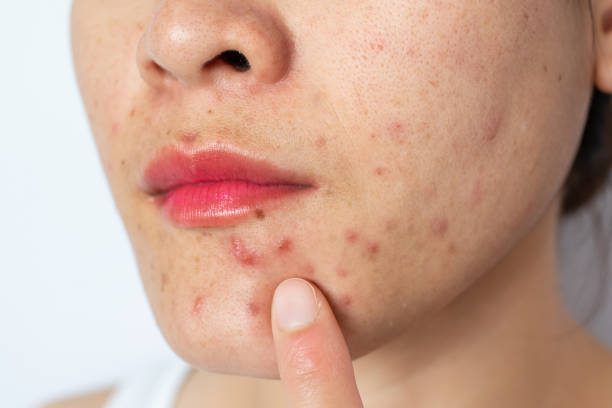Why do we get pimples? Pimples, also known as acne breakouts, happen because of things like hormones, too much oil on our skin, and bacteria. Knowing these reasons can help us prevent and treat acne breakouts, blackheads, and other skin conditions caused by factors. Let’s learn more about what causes acne and how to make our skin better.
Key Takeaways
- Understanding Acne: Learning about acne, breakouts, hair follicles, and scarring can help you take care of your skin better.
- Hormonal Influences: Learn how hormones affect acne and discover ways to balance them.
- Genetic Factors: Learn how genes affect acne and adjust your skincare routine to match.
- Lifestyle and Acne: To stop pimples, do good things for your body like washing your face, eating healthy, and relaxing.
- Debunking Myths: Learn the truth about acne to pick the best treatment.
- Clogged Pores: To stop pimples, clean your face gently and scrub it softly to keep pores clean from dead skin cells.


Understanding Acne
Causes Overview
Acne happens when too much oil in the skin clogs pores and makes pimples. This extra oil, called sebum, from sebaceous glands mixes with dead skin and germs, causing redness and inflammation.
When our skin makes too much oil, it can cause pimples and acne. This happens when the oil blocks our hair holes and lets bacteria grow. Then we get blackheads, whiteheads, acne, and pimples on our skin.
Inflammation makes acne red, swollen, and sore. It happens when germs get stuck in hair follicles, causing inflammation, and the body tries to fight them.
Development Process
Acne starts when dead skin and oil get stuck in hair pores and sebaceous glands, making it a good place for bacteria to grow fast.
Clogged hair holes and dead skin cells make acne worse by letting bad bacteria grow. These bacteria cause redness and swelling in pimples.
Bacteria make acne worse by releasing stuff that irritates the skin, causing pimples and big bumps.
Recognizing Symptoms
Acne can make your skin have blackheads, whiteheads, red bumps, pus-filled bumps, big lumps, and painful lumps. It’s important to spot these signs early to help treat them well and stop scars.
If you see acne early, you can treat it quickly with the right skincare or medicine. Where the acne is on your body can show why it’s happening and guide how to treat it.
Spotting symptoms helps handle current breakouts and stop more by fixing why they happen, like hormones or food.
Hormonal Influences
Hormonal Changes
Hormones change during puberty and cause acne. They make our skin oily, clog pores, and give us pimples. Boys and girls are affected in different ways.
When you grow up, your body makes more oil that can make pimples pop up. Boys usually get worse pimples because of certain hormones, but girls can also get pimples because of their periods or when they’re having a baby.
Testosterone’s Role
Testosterone makes acne worse by telling the skin to make more oil. More testosterone means more oil, making acne worse.
When male hormones like testosterone levels go up, people might get more pimples because their skin makes too much oil. Knowing how testosterone affects oily skin can help treat acne and stop more skin problems.
Challenges in Women
Girls can have more pimples because of hormones during their period or when they’re pregnant. This can make them feel upset and not confident. Some women get acne later in life and need special treatment.
I had bad acne because of my hormones. I saw that my skin got worse at certain times in my cycle. Learning about how hormones affect skin helped me make a skincare plan that worked. Talking to a doctor was important for making my skin better.
Genetic Factors
Family History
Family history is important for acne. It can tell us if our hair follicles might get acne too. Knowing this helps us take care of our skin better.
Studying how family history affects acne shows that some genes can make people more likely to get pimples. If your family has a history of acne, you might also have it.
It’s important to know the genes that cause acne for good treatment. Some genes affect oil on the skin, redness, and how skin cells renew, which all cause acne. Doctors can use this health information to give treatments that work better.
Knowing about your family history can help doctors understand your acne risk and plan to treat it better. By looking at genes and hormones, doctors can find the best way to help you with your acne.


Lifestyle and Acne
Diet Impact
Eating certain foods can make acne worse. Foods like white bread and sugary snacks can make acne redder and oilier.
Milk and cheese can make acne worse because they have hormones that make skin oily. When I stopped eating them, my skin got better.
Stress Effects
When we feel stressed, our body makes a hormone called cortisol. This can make our skin oilier and redder, which can make acne worse or start new pimples.
Doing yoga, meditation, or going outside can help make acne better. I do mindfulness stuff every day and it makes me less stressed, and my skin looks better too.
Debunking Myths
Hygiene Misconceptions
Some think not washing their face causes pimples, but it’s not true. Pimples mostly come from hormones and genes. Be gentle with skincare to help with pimples. Too much washing can make pimples worse.
Did you know that acne doesn’t come from having dirty skin? Washing your face too much can make your skin oily and clog your pores. To keep your skin clean and prevent acne, use products that won’t clog your pores and don’t scrub too hard.
I use gentle products for sensitive skin to keep my acne under control. Using mild cleansers instead of harsh ones helps prevent breakouts. Remember, less is better for acne-prone skin.
Dirty Skin Myth
Some people think dirt causes pimples, but that’s not true. It’s good to wash your face, but too much can mess up your skin. Use gentle soap and don’t scrub too hard to keep your skin happy.
Keeping clean to manage acne is important. I found out that using gentle exfoliation helps reduce breakouts by getting rid of dead skin cells. It makes my skin feel better.
Clogged Pores
When pores and hair follicles get blocked by oil, dirt, and germs, they make blackheads and whiteheads. These pores are where hair grows from and have oil glands. The blockage makes the skin red or infected.
Other Triggers
Medications
Some medicines can make acne worse by making skin oily or inflamed. It’s important to know how meds can affect acne. Talking to a doctor before taking new meds can help avoid making acne worse.
Some medicines can make acne worse. They can cause hormonal changes or block pores, leading to more pimples. Knowing how medicines affect acne can help choose the right treatment.
Before you use any medicine for pimples, talk to a doctor first. They can help you pick the right treatment and tell you about any bad effects. Talking to a doctor first will help you treat pimples safely.
Environmental Factors
Dead skin, stuff in the air, and sun can make acne worse. Keeping skin safe from these things is important for having beautiful skin.
Dirty stuff in the air can make pimples worse. Weather changes can also affect the skin and make acne worse. Protecting the skin is important to control acne.
To keep your skin safe, wear sunscreen and wash your face every day. Drink water and take care of your skin to prevent acne from the environment. These things can protect your skin from making acne worse.


Seeking Medical Advice
When to See a doctor
If acne won’t go away with store-bought stuff, see a doctor for help. Getting help early can make acne better.
If you see bad acne like big bumps on your skin, talk to a doctor. They can help stop acne marks and keep your skin healthy.
Getting help early can stop bad acne. Ask a doctor for a treatment that fits your skin. Don’t wait to get help with tough acne.
Treatment Options
There are different ways to treat acne. You can use creams or pills. Creams like benzoyl peroxide and salicylic acid help with mild to moderate acne by cleaning pores and making redness go away.
When acne is bad, doctors can give you pills to help. The pills fight bacteria and control oil on your skin. These pills are for bad acne that doesn’t go away with creams.
When picking a treatment, think about your skin type and if you have any allergies or sensitivities. Talking to a skin doctor can help you find the best treatment for your skin problem.
When I had acne, going to the doctor helped me a lot. They gave me the right treatment for my skin, and it made my skin better and made me feel more confident.
Managing Complications
Preventing Scars
To stop acne scars, don’t pick or squeeze pimples. Treat acne early to help prevent scars on your skin.
To care for acne skin, use gentle cleaners and products that don’t block pores. Moisturize a lot to keep skin healthy and reduce scars. Always wear sunscreen to protect your skin from the sun and prevent more damage.
Long-Term Effects
Not treating acne can make skin unhealthy and cause problems like spots and bumpy skin. Wash your face regularly to help with acne. Seeing a doctor early can stop issues and make skin better later.
To keep your skin clear, make sure to wash, moisturize, and use acne treatments regularly. Everyone’s skin cells are different, so what works for one person may not work for you over time. Find products that match your skin type and fix your issues.
Taking care of my body by drinking water, eating healthy food, and sleeping well has made my skin better. I also do things like meditating and exercising to feel less stressed and have nicer skin.


Final Remarks
Knowing why acne happens can help me choose better skincare. Hormones, genes, habits, and other things affect acne. Learning the truth and seeing a doctor is key to beautiful skin. Dealing with issues early is important for healthy skin.
To have flawless skin, it’s important to know what causes acne and how to treat it. Learn more, be proactive, and ask experts for help when you need it.
Frequently Asked Questions
What are the main causes of acne?
Acne is when your skin makes too much oil, pores get clogged, germs grow, and skin turns red. Family genes, food, stress, and some medicines can make acne worse.
How do hormonal influences affect acne?
When we get older or have our period, our skin can make too much oil. This extra oil mixes with old skin and blocks our pores, which can lead to pimples from bad bacteria.
Are genetic factors responsible for acne?
Genes decide if you get acne. If your parents had it, chances are you will too because of things like how much oil your skin makes and how fast your skin cells change.
What lifestyle factors can contribute to acne?
Bad things like eating junk food and not washing your face can worsen acne by accumulating dead skin, making pimples worse. Good things like eating healthy and washing your face can help stop pimples.
How can one effectively manage acne complications?
It’s important to see a skin doctor for bad acne. They can give you medicine like creams or pills or use lasers to help. You need to keep going back to the doctor for it to work.


